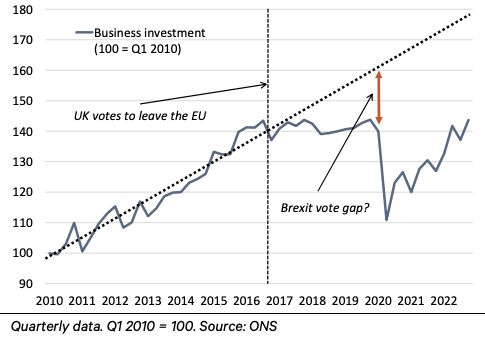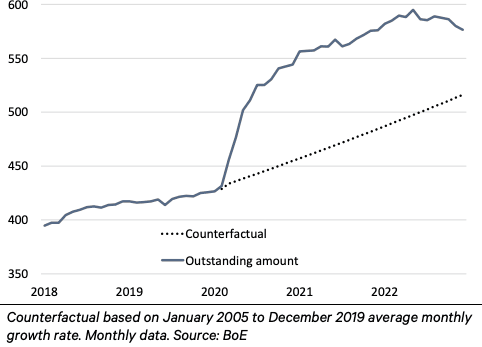Improved Political Outlook Bolsters Pound Sterling's Prospects against the Euro and Dollar
- Written by: Gary Howes
- UK politics showing signs of stabilisation
- Following years of 'populist' disruption
- Should spur business investment
- Ensuring Pound is better supported

Image © Adobe Images
A stabilising political outlook means the UK economy could put in some better performances over the coming months, delivering the upside data and sentiment surprises required to underpin a meaningful recovery in the Pound.
One analyst we follow says the "stable hands" of Rishi Sunak, hopes for a settling in EU-UK relations and a more centrist Labour Party could spell the start of a more stable time for UK politics, which would encourage an increase in much-needed business investment.
"If UK political uncertainty continues to ease and the UK avoids a bad recession (likely), the outlook appears favourable," says Kallum Pickering, Senior Economist at Berenberg.
In a potentially significant development, the Labour Party has committed to delivering the highest sustained growth in the G7 if it should win power in 2024.
The commitment comes alongside other pro-business policies that reflect a 'derisking' of the official opposition towards the economy as it distances itself from the socialist-leaning Corbyn years.
"A likely power shift from Sunak's centre-right Conservative government to Starmer’s centre-left Labour at the next election – likely in late 2024 – may even strengthen the argument that a) the worst of the Brexit uncertainty is over, and b) the UK has recovered from its populist phase," says Pickering.
The UK economy faced a bleak outlook at the start of the year as a plurality of economists foresaw a multi-quarter-long recession taking hold amidst a cost-of-living crisis and fiscal restraint posed by the government as it seeks to win back market trust following the turmoil of the brief Truss era.
But the outlook has already improved markedly since the start of the year with this week's better-than-expected PMI report showing the UK economy returned to growth in February, following a slump in January.
Compare Currency Exchange Rates
Find out how much you could save on your international transfer
Estimated saving compared to high street banks:
£2,500.00
Free • No obligation • Takes 2 minutes
S&P Global's PMI survey for February said businesses had reported rising customer demand and improving business confidence in February as the economy returned to growth.
The degree of optimism regarding business activity over the next 12 months was meanwhile the highest since March 2022 with a number of survey respondents commenting on stronger demand for business services amid an improving global economic outlook and reduced domestic political uncertainty.
This forward-looking component of the PMI report has now risen in each of the past four months, signalling a strong recovery in business confidence from the low point seen last October in the wake of the Truss mini-budget debacle.
The PMI surprise boosted demand for Pound Sterling, with the Pound to Euro exchange rate rallying back above 1.1350 on the data while the Pound to Dollar exchange rate cemented itself above 1.20.
The PMI data follows stronger-than-expected labour market statistics mid-month and retail sales that also came in above expectation in January.
But it was an improvement in UK business investment, contained in the most recent set of GDP figures, that caught the attention of numerous economists.
"Real business investment increased by c10% during 2022 – with a 4.8% qoq rise in Q4 alone," says Pickering.
Above: "The ONS has revised up business investment" - HSBC.
"The recovery in business investment is the best news in the Q4 GDP release," says Elizabeth Martins, Senior Economist at HSBC. "Long may that last."
Business investment matters greatly as it could hold the key to the UK's economic performance over the coming months and years as the investment in fixed capital would prompt increases in productivity.
In short, a more productive country is a richer country.
Indeed, Starmer said a UK-wide boost to productivity was key to ensuring his party met its goal of securing the strongest sustained growth in the G7 by the end of its first term in office.
Pickering says he is optimistic the recent improved trends in business investment can continue, largely because the UK's political climate is normalising.
Above: UK real business investment. Image courtesy of Berenberg.
"After nearly six years of noise and chaos, the UK seems to be returning to something resembling a more normal political environment," he says in a recent note.
"Following the failures of two populists (Boris Johnson and Liz Truss), the typically sensible Conservatives have put a safe pair of hands (Rishi Sunak) back in the prime minister’s seat," he adds.
Truss attempted to boost the UK economy with aggressive tax cuts while showing no restraints on spending, leading investors to ponder how the government would finance itself.
A cavalier approach to raising the country's debt scared bond markets which promptly dumped UK debt, sending interest rates soaring and spooking households and businesses alike, as reflected in record lows for some consumer confidence readings and a series of chronically poor business sentiment surveys.
"The UK has been at risk of further negative impacts from firstly the self-inflicted uncertainties unleashed by Truss's doomed and unfunded Growth pact and a coordinated series of strikes. Nevertheless, the impacts on the economy appear to have been decidedly less severe than feared," says Franulovich.
Above: Businesses have the financial firepower to invest. The chart shows deposits of UK non-financial businesses (£bn). Image courtesy of Berenberg.
Franulovich says the UK economy and Pound could benefit further on signs peak pessimism has now passed, "the combination is providing a floor for GBP, notably against EUR."
"It is normal for politics to go awry from time to time and for the economy to suffer as a result. Before the UK's latest wobble, this last happened in the 1970s. But once things started to get back on track by the early 1980s, economic performance improved rapidly. With any luck, the worst of the political uncertainty that has held back business investment since the Brexit vote is coming to an end," says Pickering.
It is meanwhile widely reported that the UK and EU are narrowing in on a deal that would settle the Northern Ireland protocol, divisions over which have long proven a festering wound between the two sides.
"Lifting the threat of a tit-for-tat trade war with the UK’s biggest market, the EU, is exactly what UK businesses and financial markets
need," says Pickering.
Compare Currency Exchange Rates
Find out how much you could save on your international transfer
Estimated saving compared to high street banks:
£2,500.00
Free • No obligation • Takes 2 minutes







